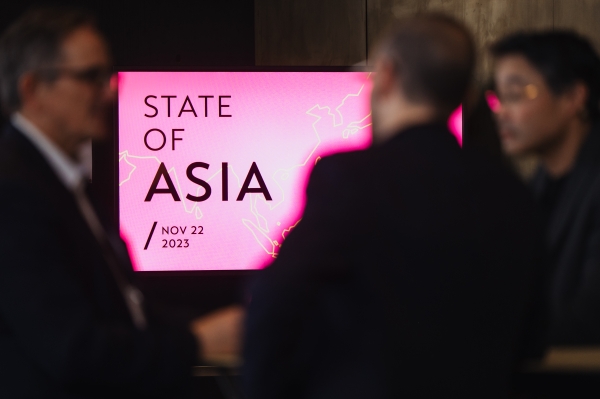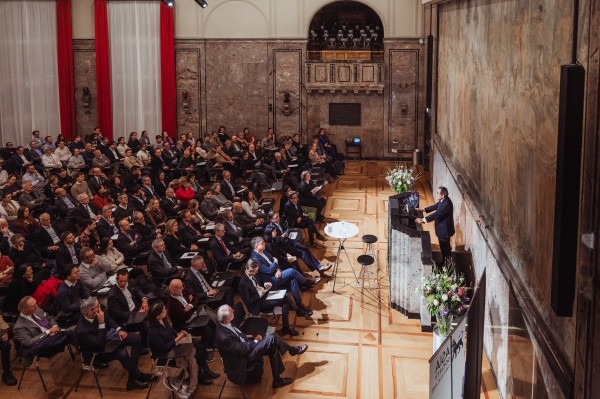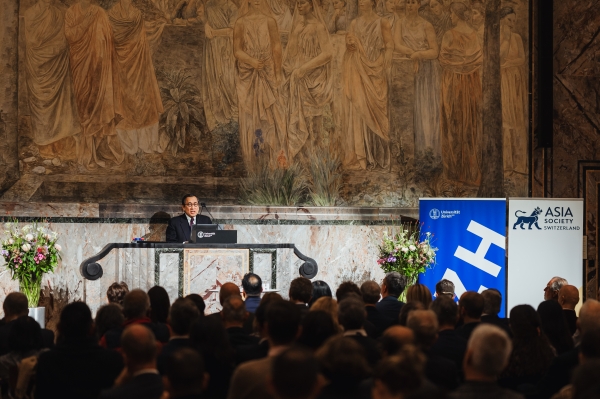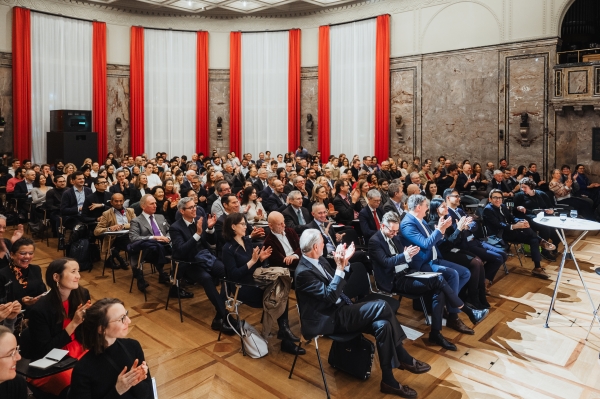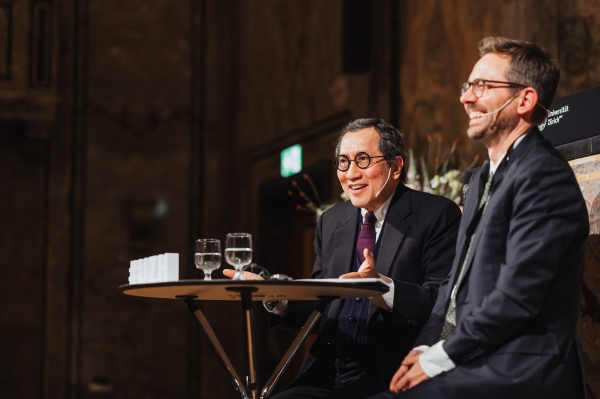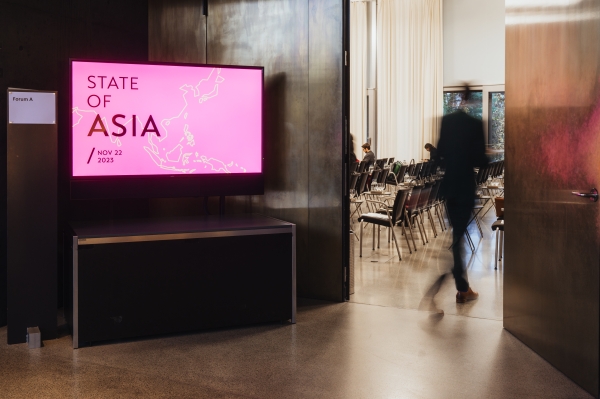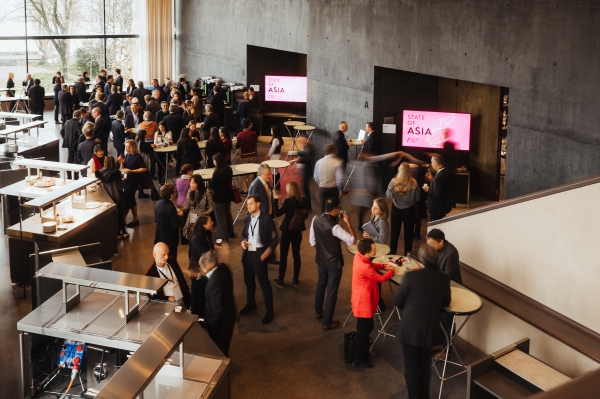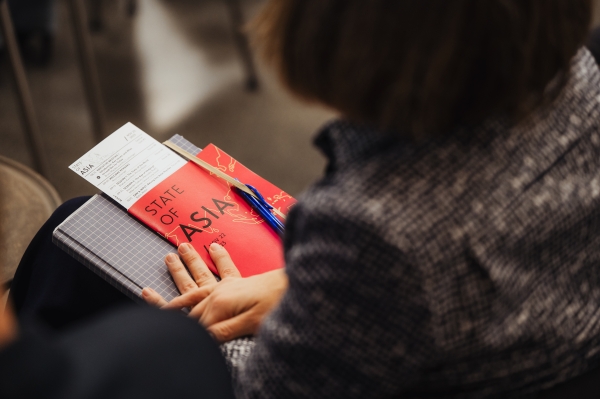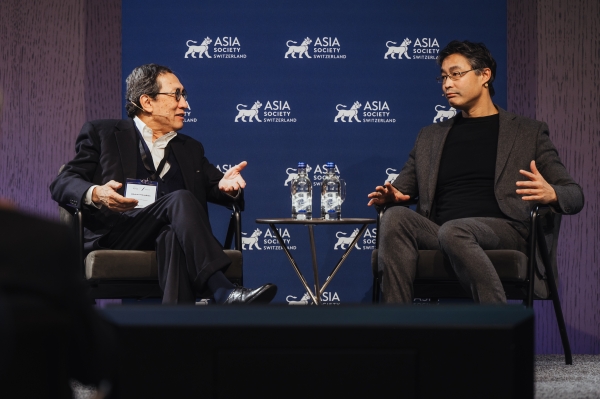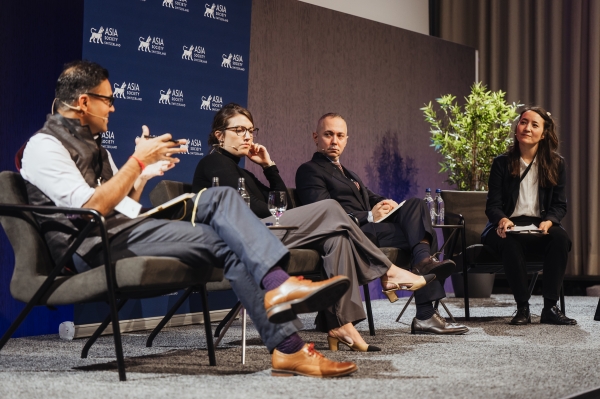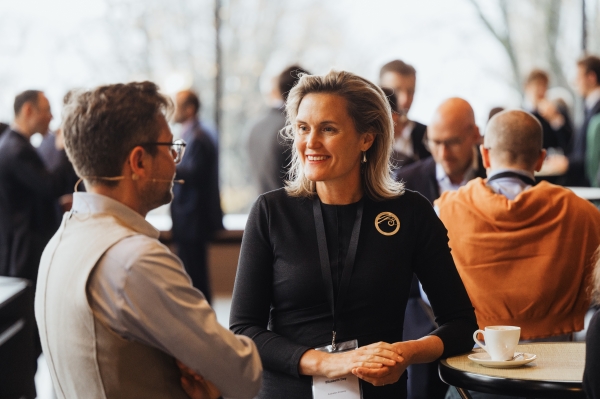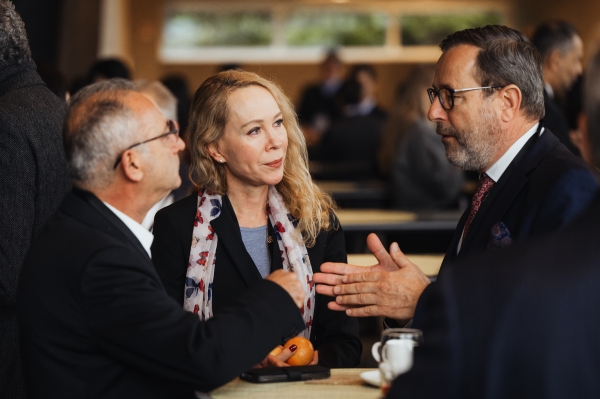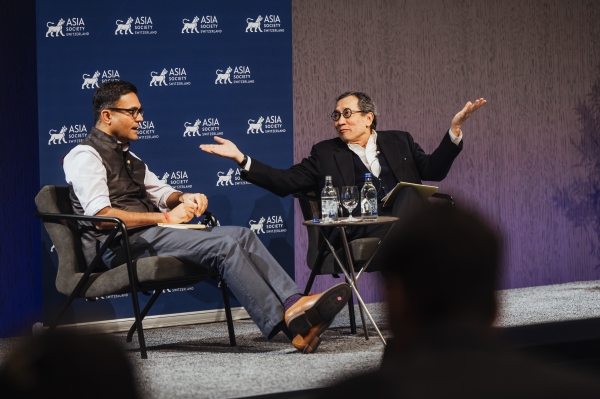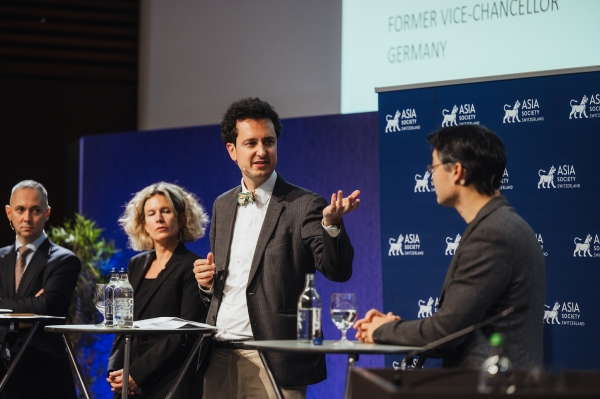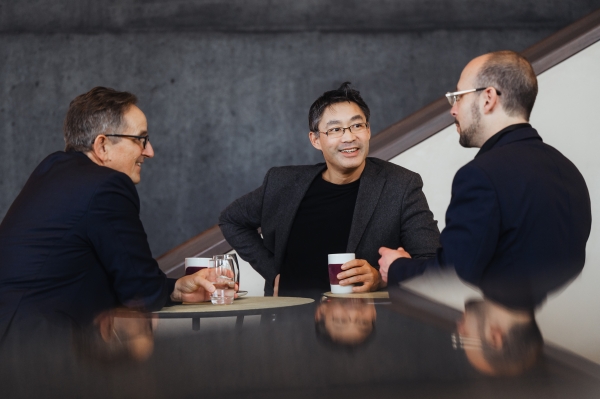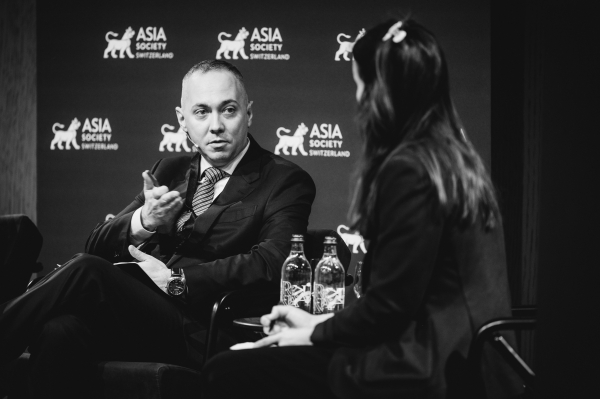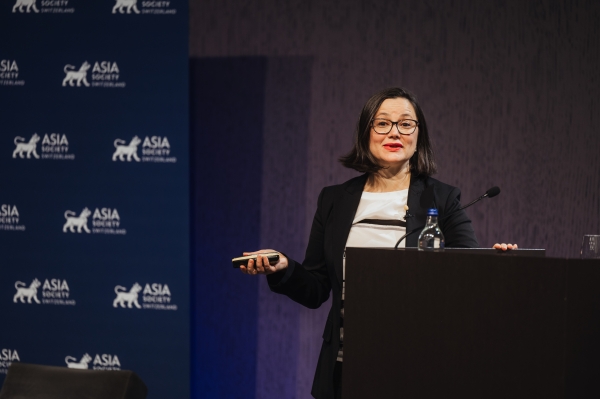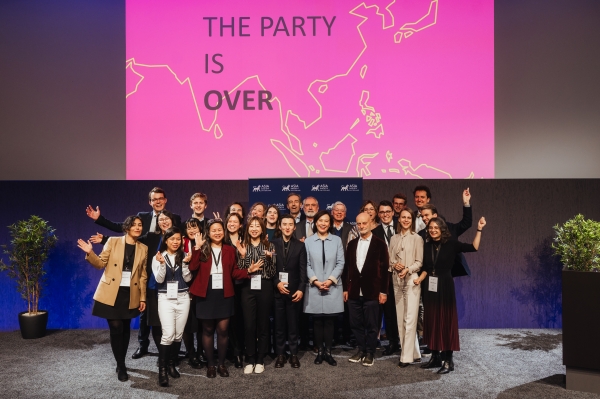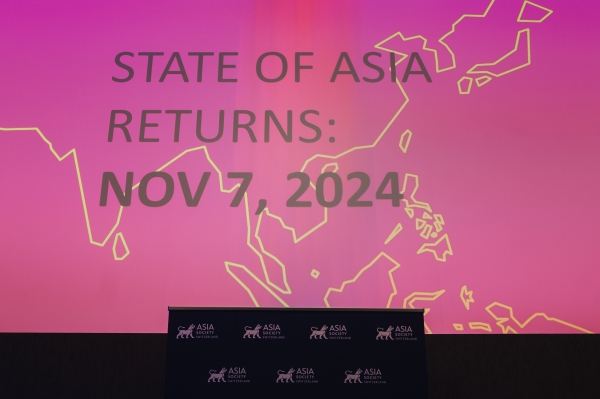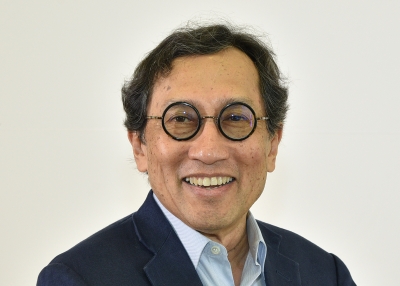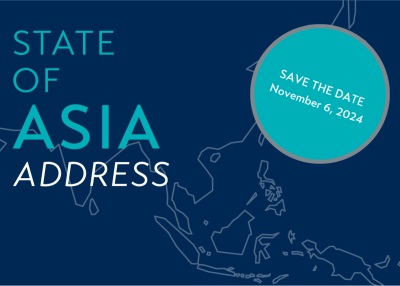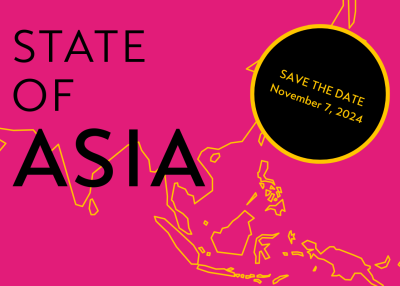STATE OF ASIA 2023
A Conference on the World's Most Dynamic Region
All pictures by André Hengst. Explore the complete gallery here.
And that's two! The second edition of our STATE OF ASIA conference is now behind us. And what a success! Speakers from different corners of the world and 140 carefully selected guests joined us at the beautiful Swiss Re Centre for Global Dialogue to discuss the crucial developments currently unfolding in Asia.
You couldn't attend in person but wish to catch up? We've got you covered: videos of all sessions and their key takeaways are now available below and also on YouTube.
In addition, you can also watch the video, listen to the podcast or read the transcript of the State of Asia Address the night before the conference featuring Bilahari Kausikan's with his enlightening and thought-provoking answer to the question "Could this be the Asian Century?".
And you can also find - and more importantly download - all the pictures taken at the event by our stellar photographer André Hengst.
You wish to be among us next year? You can already save the date: STATE OF ASIA is returning on November 7, 2024. We're looking forward to welcoming you once more to explore and discuss the developments of the world's most dynamic region with us.
State of Asia Address, November 21
STATE OF ASIA, November 22
- Welcome Remarks
- The State of the World
- The Age of Hedging?
- Peak China or New China?
- A Look at 2024 Elections — Taiwan, Indonesia, India, U.S.
- Key Risks in Asia
- What the State of Asia Means for Us
- Gen A x STATE OF ASIA
- Gen A Input – Delving Into Asian Psyches
- Gen A Input – Delvaux: Reinvention of Heritage
- Gen A Input – South Korea's Demographic Ticking Clock
State of Asia Address 2023
With Bilahari Kausikan
The Address was delivered by diplomatic veteran Bilahari Kausikan, whose career includes positions as Ambassador of Singapore to Russia and the United Nations, and Permanent Secretary of the Ministry of Foreign Affairs of the city-state. Listen to it as a podcast, or read the transcript. Here are our key takeaways:
Calling the 21st century Asian is simplistic and ignores complex realities
- 'Asia' is often a code name for China. Associating an entire political era or order with any single country or continent imposes a unity of thought and purpose that often simply does not exist.
- Relations among the countries of Asia are complicated, often with China at the center of many of the complications. Nationalism in Asian countries is more often than not directed against other Asian countries. This forms a serious limitation to the idea of an ‘Asian century’.
Asia has to be dealt with in its own right, not as an accessory to larger forces
- Asia is not an accessory that is only relevant if it concerns Europe or the U.S., like during the colonial era or the Cold War.
- There is better understanding that Asian countries are nations with long histories and deep pride, that are never going to be anybody’s tool. But the mental transition of thinking about ‘Asia’ as arena to thinking about ‘Asia’ as actor is still incomplete.
- Reducing Asian countries to pawns in whatever larger forces strike one’s fancy objectifies the countries involved and brushes aside their diversity.
Asia, a naturally multipolar region, can be a model for the emerging new global system
- The U.S. and China are geopolitical facts that no country can ignore. All other countries have concerns about both American and Chinese behavior. No country wants to align all their interests across all domains in one direction or the other.
- A system of dynamic multipolarity is evolving. The U.S.-China relationship will be the main axis around which eclectic groups of countries will continually form, dissolve, and reconstitute themselves in different coalitions on different issues as their interests dictate. This system of ever-shifting coalitions will form an overlay for existing alliances.
- Asia’s diversity makes it a naturally multipolar region. Since Asia is also the epicenter of the broad shifts that are occurring in global politics and driving dynamic multipolarity, it will be the testbed for the emerging new system that will spread around the world. In this sense, Asia as a model may well come to define an ‘Asian century’.
Welcome Remarks
With Nico Luchsinger
Asia Society Switzerland Executive Director Nico Luchsinger delivered the opening remarks, highlighting the significance of Asia, the importance of geopolitics, and the necessity for increased Asia Competence.
The State of the World
With Bilahari Kausikan and Philipp Rösler
Singaporean diplomatic veteran Bilahari Kausikan and Philipp Rösler, former Vice-Chancellor of Germany, opened the STATE OF ASIA conference with a conversation about Europe’s struggles to adapt to a multi-polar world. Key takeaways from their conversation:
Europe needs a wake-up call
- Every country is affected by the competition between China and the U.S. and has to find its way in this relationship.
- There is no country without concern about the U.S. or China, and no country can choose to ignore either. The world is entering an age of multi-polarity, filled with ambiguity and ambivalence. This requires agility and alertness at a state level.
- Of all global regions, Europe, including Switzerland, unfortunately is the slowest to adapt to this new reality and needs a wake-up call.
Focus on interests over values
- Contrary to Europe, Asian countries never believed the world was neatly organized in blocs adhering to one set of common values or the other.
- Some European countries are moving from interest to value-based foreign policy. Using values as a foreign policy tool is not productive. Countries talk about values if they don’t know what their interests are.
- Europe still has not defined what its interests in Asia are.
- Asia does not see Europe as a bloc of nations with common values. Seen from Asia, Europe really just means the countries that are economically important to the region: Germany, France, the UK, and the Netherlands. The same goes for the EU: interacting with Brussels will for now come only after dealing with individual countries.
Europe’s views of China are still naive, but have become more realistic
- Around the Beijing Olympics in 2008, China could do no wrong in the eyes of Europe. Now, Europe has moved in the opposite direction, being mostly very hostile to China.
- Both approaches are naive. Eventually, Europe will figure out how to deal with both China’s weaknesses and strengths in a more balanced way, but that moment is not here yet.
- As long as Europe can’t deal with Russia without having the U.S. at its back, it won’t be able to deal with China on its own.
The Age of Hedging?
With Alexander Gabuev, Mercedes Ruehl, and Milan Vaishnav. Moderated by Serena Jung
Mercedes Ruehl, Southeast Asia correspondent for the Financial Times, together with Milan Vaishnav and Alexander Gabuev, both of the Carnegie Endowment for International Peace, discussed the changing geopolitical relationships in Asia. Here are the key takeaways from their conversation:
Southeast Asia is handling the U.S.-China competition quite well
- Thanks to solid economic growth and increased global interest in the region, Southeast Asian nations have so far skillfully managed to stay in the overall good graces of both the U.S., granting more access for the American military, and China, by participating in Belt and Road projects.
- The region has benefitted from the China + 1 manufacturing shift. This sees multinational companies, including Chinese ones, diversify their investments. Rather than going all-in on China, businesses also build manufacturing capacity in other promising developing economies while maintaining a base in China.
Hedging geopolitical relationships goes beyond the ‘U.S. or China’ option
- Countries are looking to be part of multiple alliances simultaneously, even if these seem to contradict each other. It’s a way to deal with a broader set of challenges, instead of singularly choosing a side in the great power competition.
- Vietnam is a prime example of this, receiving both a high-level Chinese delegation as well as upgrading its diplomatic ties with the U.S. in the same week.
- For ASEAN, engagement with China remains important, not just economically, but also to prevent military action from spiraling. At the same time, particularly Indonesia is warming to the QUAD grouping of the U.S., Japan, India, and Australia, as a counterweight to China’s increased military activity, while ‘not yet’ joining the China-led BRICS group this year. Multiple Southeast Asian countries recognize they can increase their leverage by getting more involved in the alliance.
India feels confident to engage on its own terms
- For India, the multipolar system offers opportunity to exploit the friction between China and the U.S. to further Indian national interests. New Delhi is confident and assertive, as nearly every country in the world is looking to India as a potential partner. This is fueled by decades of solid economic growth and the political stability offered by Modi’s leadership which is likely to continue for many years.
- This also means India is not the great new American ally in Asia some in Washington, D.C. hope for. India, frustrated by the lack of representation in existing international institutions like the UN and the IMF, will continue to hedge its relationships to serve its own interests. It remains involved in BRICS to keep the West on its toes.
Asian countries benefit from Russia’s lack of options
- Since Russia’s relations with the West have evaporated, it has no other option than to double down on China. The relationship is comfortable for China, as it can dictate the terms.
- Asian countries are opportunistically profiting from Russia being out of options, buying Russian commodities at budget prices. Europe and the U.S. accept this, as the global market would face too much disruption if Asia would stop buying Russian commodities.
- Russia is not a presence in Asia, neither militarily nor economically. All its relations are built on how a country can help fill the war chest, provide military technology, or annoy the West. China covers all three, North Korea the latter two.
Peak China or New China?
With Keyu Jin, Jörg Wuttke, Simona Grano, and Alexander Gabuev
Moderated by Martina Fuchs
Keyu Jin, Professor at the London School of Economics, and Jörg Wuttke, President Emeritus of the EU Chamber of Commerce in China, discussed economic developments in China. Key takeaways from their conversation:
China’s economy is in trouble, yet still has huge potential
- Economic growth is at its lowest level in decades, the outlook is uncertain, debts and youth unemployment are high. After COVID, China opened up last, without offering support packages to citizens or companies. This means recovery will take a long time.
- China’s potential is much better than that of other developing countries, because China has the capacity to innovate, and increase productivity and the share of the service sector in its GDP.
- The country is at the cutting edge of developing new technologies, leading in 35 out of 44 research fields, instead of importing knowledge like in the past. This happens in sectors that have a bright future: electric vehicles, renewable energy, AI, cloud data, among others.
- 176 million migrant workers form an untapped potential, who with better-paying, stable jobs could be ready to unleash at least a trillion RMB in domestic spending.
- This will not replace the value the real estate sector once had, forming 30% of China’s GDP. Real estate had been operating on steroids. That has structurally changed now, meaning China’s economy will have to make do with lower growth. A stable 3 percent growth could be the best-case scenario.
China remains crucial for European business
- The declining economic outlook, as well as pressure from home and capital markets, force European businesses to reconsider their presence in China. Most are over-exposed to the country and should diversify their investments to other countries.
- China remains crucial for European businesses, however. Even at slow growth, the Chinese economy by 2028 will still be significantly larger than India’s.
- China is also a major source of brain power, educating engineers and other specialists which Europe doesn’t have enough of. Truly competitive, global companies cannot abandon China.
- However, restrictions limit what European companies can do in China. The potential would be much more promising if China would open up its market.
China needs to export
- China has a staggering overcapacity in its manufacturing sector. Domestic consumption is too low, so China will have to export to stay in the game.
- This makes the country increasingly dependent on consumers in Europe and elsewhere. At the same time, China is turning its back on the West for cultural and academic exchanges. That’s a waste of massive potential and risks underperformance.
The economy is not as centralized as many think, which is good
- While China is politically extremely centralized, economically it’s the opposite. Local governments all over the country are competing with each other for government subsidies and foreign investment, building multiple silicon valleys. This pushes the growth rate.
- The country seems to take two steps at once though: it enacts a wide-ranging espionage law, while at the same time making a push to attract foreign investment. This leads to negative sentiments among both investors and local lenders.
A Look at 2024 Elections — Taiwan, Indonesia, India, U.S.
With Simona Grano, Mercedes Ruehl, Milan Vaishnav, and Bilahari Kausikan
Simona Grano, Senior Fellow at Asia Society’s Center for China Analysis; Mercedes Ruehl, Southeast Asia correspondent at the Financial Times; former Singaporean diplomat Bilahari Kausikan; and Milan Vaishnav of the Carnegie Endowment for International Peace looked ahead at some crucial elections coming up in 2024. Here are the key takeaways from their conversation:
Taiwan – No one wants more tensions
- The Taiwanese elect a new President on January 13, 2024. Chances are good for William Lai Ting-che, the current Vice-President. His win would mean the DPP, a party which signals Taiwan should keep its distance from mainland China, would get a historic third consecutive term delivering Taiwan’s President.
- All candidates know it would be in Taiwan’s best interest to keep relations with China stable and tensions down. This is also what’s best for attracting investors to Taiwan.
- China would prefer the opposition KMT win, which historically favors closer ties with Beijing. China paints the DPP as a ‘splittist’ party whose win will increase chances of war. This is also a campaign tactic of the KMT.
- China’s attempts to sway the Taiwanese public to vote for the China-friendly party in an election have usually backfired.
Indonesia – Securing Jokowi’s legacy
- The Indonesian presidential election takes place on February 14, 2024. Outgoing President Joko Widodo, still hugely popular, has become increasingly obsessed with securing his legacy.
- Front runner is Minister of Defense Prabowo Subianto, who has been running for President against Jokowi in both 2014 and 2019. Prabowo has Jokowi’s son as a running mate, a way for the outgoing President to ‘keep your friends close, but your enemies closer’. Prabowo has been accused of war crimes and was dismissed from the military.
- Many in Indonesia, the business community included, would have wanted self-made man Widodo to get an unconstitutional third term. He failed in changing the constitution, after which he got his ineligible son to be allowed to run through a ruling from a judge who is also a family member.
- Indonesia has a reputation as an important democracy in Southeast Asia, making these developments worrying to NGO’s and the upper middle class. Jokowi’s base however, including the many young Indonesians that support him, don’t seem to worry about democratic backsliding.
- Widodo built a lot of infrastructure around the country, which was badly needed. This is his most important legacy. Economic growth has been decent as well, although the feeling is he could have done more to increase Indonesia’s stature on the global stage.
India – Cashing in on the moment
Prime Minister Narendra Modi is expected to cruise to victory in the May 2024 parliamentary elections in India. There is no one in the opposition nationally who can go toe-to-toe with Modi’s popularity.
Despite new efforts to form an alliance with the acronym I.N.D.I.A., and a few successful campaigns in individual states, the opposition remains weak, unorganized, with no clear leadership candidates other than members of the influential Gandhi family.
- There’s a strong sense among the elite that this is India’s moment, though a lot still has to be done. Especially in fields like education and health care, India has to make up for lost time.
- Modi is expected to focus on two major items in his third term: implement a uniform civil code for all citizens, instead of the religion-specific laws India currently has; and to create a ‘one nation, one election’ system. This means elections for state and national level will all happen at the same time. This would help Modi’s BJP to ride his popularity in state elections as well, where, contrary to the national level, the party has been losing voters.
- Modi has changed foreign policy from being something only the elite cares about to a mass issue. India is brimming with self-confidence, feeling the world needs India more than India needs the world. The common person credits Modi for that.
- The country is looking to the West for investment and technology but is reluctant to become an American pawn in the U.S.-China competition.
United States – The transactional superpower
- Since the end of the Cold War, the focus of every U.S. President has been domestic, with the exception of George W. Bush after 9/11.
- The U.S. has become more transactional in international relations. A President talks to you not because of shared values, but to find out how you can help further his agenda. That goes for Biden, as well as for Trump.
- Asia has much more experience with this, dealing with the U.S. according to what interests are at stake. Europe is still attached to the idea that the transatlantic alliance is based on values, not on interest. That will be challenged.
- Most Asian countries would favor continuity in the U.S., with a second term for Biden. They prefer ‘polite transactionalism’ over Trump’s crude demands.
- Southeast Asian countries were already on the path of multi-alignment before the first Trump administration. To them, it is not a binary choice: China for economics, the U.S. for security. The U.S. invests more in Southeast Asia than Japan and South Korea combined.
- The main reason countries like Vietnam and the Philippines are moving closer to the U.S. currently, is because of China’s aggressive, failed foreign policy.
Key Risks in Asia
With Veronica Scotti
Veronica Scotti, Chairperson of Public Sector Solutions at Swiss Re, spoke about the key risks in Asia. Key takeaways from her presentation:
There is a substantial protection gap
- Globally, the gap between potential damage and how much of that value is protected by insurance has reached USD 1.8 trillion in 2022.
- Infrastructure funding in Emerging Asia, excluding China, requires a massive USD 1.7 trillion.
- This underscores the critical role of insurance and reinsurance risk mitigation.
Countries in Asia need to tackle a variety of risks
- Japan, though prepared to deal with earthquakes, is still vulnerable to significant losses due to a high concentration of asset values. Private insurers should enhance earthquake risk coverage.
- India’s infrastructure needs improvement in quality, risk management, and private funding.
- Thailand’s economy relies heavily on agriculture. Data models using satellite imagery help innovate preparations to deal with risks facing crops.
- China faces health protection and mortality gaps. Solutions include expanding public health insurance, introducing a 3-pillar pension system, and addressing issues related to an aging population and economic slowdown.
Collaboration and innovation offer solutions
- The private sector can effectively bridge these gaps by collaborating with public entities, leveraging risk expertise.
- Political and regulatory incentives are crucial in fostering innovation and attracting the necessary funding.
What the State of Asia Means for Us
With Philipp Rösler, Simona Grano, and Alexander Gabuev
Moderated by Nicola Forster
Alexander Gabuev of the Carnegie Russia Eurasia Center, Simona Grano of Asia Society’s Center for China Analysis and the University of Zurich, and Philipp Rösler, former Vice-Chancellor of Germany, discussed what the State of Asia means for Europe. Here are the key takeaways from their conversation:
In-depth knowledge, gained through engagement, is crucial
- To properly assess the impact developments in Asia have on Europe, a deep knowledge of what is happening in Asia is vital.
- This granular expertise comes from investing in academic as well as practical engagement with the region. It's the cornerstone of formulating effective policies and responses to shifting geopolitical and economical dynamics.
- At the same time, it is likely countries like China and Russia do not fully grasp how the EU or specific European countries function either. This could lead to flawed strategies and policies from their side as well.
Europe can commit to its values, without pushing them on others
- Europe’s commitment to certain values doesn’t require their imposition on others. Values cannot be leading in foreign policy. For example, how else can you condemn China’s political system, while signing a partnership with Vietnam, which has a similar political system?
- Instead, Europe should define what its interests in Asia are, and work to protect them. Sometimes that means making a pragmatic tradeoff with values to safeguard interests.
Remaining neutral becomes increasingly complicated
- While neutrality remains a useful tool in foreign policy, it doesn’t mean a country like Switzerland can remain quiet in the changing geopolitical landscape.
- The increasing use of sanctions as a weapon makes it increasingly difficult for Switzerland, which has the financial sector as its backbone, to stay neutral.
- Switzerland will have to navigate this complexity, reflecting the broader European challenge of balancing traditional policies with emerging global realities.
Gen A x STATE OF ASIA
In its mission to foster Asia Competence, Asia Society Switzerland is committed to empowering young voices in the dialogue with Asia. We offer the Gen A (short for Generation Asia) - Young Leadership Program to young professionals and advanced students under the age of 35 in Switzerland. This year, some of the most outstanding final projects and interventions of the 2023 Gen A class were presented at the STATE OF ASIA Conference.
Interested in becoming a Gen A Fellow? Apply here before January 14, 2024. All info about the program and its current Fellows and Alumni are available here.
Gen A Input – Delving Into Asian Psyches
By Robin Weber
Gen A Input – Delvaux: Reinvention of Heritage
Gen A Input – South Korea's Demographic Ticking Clock
This event was organized in collaboration with Swiss Re Institute.


